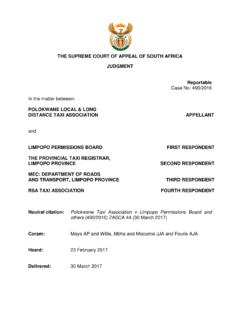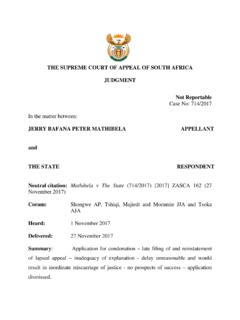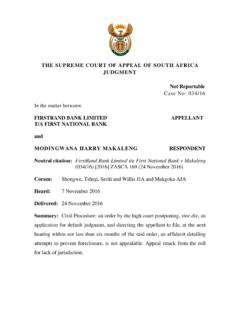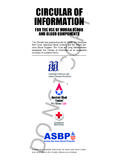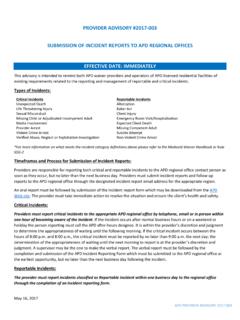Transcription of REPORTABLE (48) ZIMBABWE REVENUE AUTHORITY PACKERS ...
1 Judgment No. SC 28/2016 Civil Appeal No. SC 306/14 1 REPORTABLE (48) ZIMBABWE REVENUE AUTHORITY v PACKERS INTERNATIONAL (PRIVATE) LIMITED SUPREME COURT OF ZIMBABWE ZIYAMBI JA, GOWORA JA & HLATSHWAYO JA HARARE, FEBRUARY 12 , 2015 & NOVEMBER 24, 2016 E T Matinenga, for the appellant A J Manase, for the respondent GOWORA JA: The appellant, (hereinafter referred to as ZIMRA ) is an administrative AUTHORITY established in terms of the REVENUE AUTHORITY Act, [Chapter 23:11]. It is tasked with the obligation to collect taxes and other statutory dues and fees under various legislative instruments including the Value Added Tax Act, [Chapter 23:12], the VAT Act and the Income Tax Act, [Chapter 23:06], the Taxes Act . The respondent (hereinafter referred to as ( PACKERS ) is a private limited company duly registered as such under the laws of ZIMBABWE .)
2 It operates fast food outlets and grocery shops throughout the country and is a registered operator in terms of the VAT Act. The system of collection of VAT, as embodied in the VAT Act, involves the imposition of tax at each step along the chain of manufacture of goods or the provision of services subject to VAT. Consequently, every registered operator is required in terms of s 28 Judgment No. SC 28/2016 Civil Appeal No. SC 306/14 2 of the VAT Act, to submit returns to the Commissioner of Taxes every month, calculate the VAT due on the return and make payment of such calculated VAT. Due to the sheer volume and complexity of the VAT collection system, ZIMRA lacks the capacity and manpower to effectively monitor each and every transaction liable to VAT and as a consequence it is heavily reliant on the self-assessment process by registered operators.
3 However, in order to ensure that operators comply with the requirements to render returns and collect VAT, ZIMRA conducts periodic investigations as well as audits. ZIMRA and PACKERS have had a dispute on the manner in which the latter has been performing its obligations to file returns and render VAT to the Commissioner under the VAT Act. As a consequence, during the period extending from 20 May 2013 to 12 March 2014, ZIMRA requested PACKERS to submit returns for the period extending 2009 to 2013. On 12 March 2014, ZIMRA gave notice to the effect that failure by PACKERS to comply with its request by 17 March 2014 would result in assessments being estimated and issued. On 17 March 2014 ZIMRA advised that it was in the process of compiling the assessments in question and that in due course it would advise PACKERS of its obligations in relation to VAT, income tax and Ultimately, the assessments were issued and sent to PACKERS .
4 On 2 May 2014 PACKERS filed an objection to the assessments with the Commissioner who upheld one of the objections and dismissed the rest. PACKERS did not pay the assessed taxes resulting in ZIMRA placing a garnishee against a number of bank accounts of PACKERS held with FBC Bank for collection of an amount of USD 19 696 645-44. When PACKERS got wind of the garnishee it launched the urgent chamber application which is the subject of this appeal, in which PACKERS sought the setting aside of the garnishee order and an order stopping ZIMRA from interfering with applicant s business operations . The application was accompanied by a Provisional Order in terms of which was sought Judgment No. SC 28/2016 Civil Appeal No. SC 306/14 3 interim and final relief as appropriate. Subsequent to this, PACKERS appealed to the Fiscal Appeals Court challenging the decision of the Commissioner in rejecting the objections.
5 On 25 June 2014 the High Court issued a final order in the following terms: IT IS HEREBY ORDERED THAT: 1. The respondent uplifts and suspends the garnishee order placed on applicant s accounts with FBC Bank, immediately and forthwith, until the appeal that is pending before the Fiscal Appeals Court is finalised. 2. The respondent shall allow a period of seven working days to elapse after the up-liftment and suspension of the original garnishee order, where-after it shall replace it with a fresh garnishee order for the sum of USD 905 801-32(Nine Hundred and Five Thousand Eight Hundred and one Dollars and thirty two cents), which shall remain in place until the appeal is finalised or payment is made in full, whichever comes first. 3. The respondent shall not unlawfully interfere with applicant s business operations and its day to day activities, including the placing of its officers at applicant s business premises In determining the urgent application, the High Court found that the liability on the part of a registered operator under s 36 of the VAT Act remains extant and is not extinguished by the noting of an appeal unless the Commissioner directs that the obligation falls away pending finalisation of the appeal.
6 The court further found that the appointment of FBC Bank as agent in terms of s 48 had been done lawfully. It therefore refused to accede to the request to revoke the appointment. However, in an apparent volte face, the court a quo went on to consider the reasonableness of the exercise of discretion by the Commissioner as viewed against the provisions of the Constitution and the Administrative Justice Act [Chapter 10:28]. Judgment No. SC 28/2016 Civil Appeal No. SC 306/14 4 ZIMRA was aggrieved by the order and has appealed to this court on a number of grounds. ISSUES ON APPEAL The issues raised by ZIMRA for the appeal may be summarised as follows: -Whether ZIMRA is entitled at law to issue garnishee orders and appoint agents for the payment of value added tax. -Was the court a quo entitled to mero motu pick a dispute on behalf of the parties and determine the matter on the same.
7 -was the court a quo at law empowered to remove the garnishee order and impose an interdict against ZIMRA. Whether ZIMRA is legally entitled to issue garnishee orders for the payment of taxes assessed as being due and owing. It was contended on behalf of ZIMRA that the court a quo deviated from the cause of action as pleaded by PACKERS and gave relief framed on alleged unreasonableness on the part of ZIMRA which was raised by the court mero motu. It was contended further that if the court a quo had confined itself to the lawfulness of the conduct of ZIMRA, it would have correctly found that the actions of the latter were lawful and consequently it would have declined the prayer to issue the interdict. The VAT Act provides a detailed mechanism for vendors to keep certain records and to periodically calculate, account for and pay value added tax to the Commissioner.
8 The Act as a whole and, in particular, its provisions relating to assessments and the payment recovery and refund of tax provisions found in Part VII of the VAT Act are indispensable tools for the prompt collection of tax due. From an economic point of view, Judgment No. SC 28/2016 Civil Appeal No. SC 306/14 5 the provisions of the VAT Act are meant to ensure a steady, accurate and predictable stream of REVENUE for the fiscus. These provisions are an embodiment of the principle Pay Now Argue Later , suggesting that an appeal would not have the effect of suspending payment. The principle is aimed at discouraging frivolous or spurious objections and ensures that the whole system of tax collection in the country maintains its efficacy. This serves the fundamental public purpose of ensuring that the fiscus is not prejudiced by delay in obtaining finality in any dispute.
9 I examine hereunder the principal provisions. Section 6 of the VAT Act provides: Subject to this Act, there shall be charged, levied and collected, for the benefit of the Consolidated REVENUE Fund a tax at such rate as may be fixed by the Charging Act on the value of- (a) The supply by any registered operator of goods or services supplied by him on or after the 1st January, 2004, in the furtherance of any trade carried on by him. (b) ..not relevant. Payment of tax under the relevant Act is provided for in terms of s 28 which reads: 28 Returns and payments of tax (1) Every registered operator shall, within the period ending on the twenty-fifth day of the first month commencing after the end of a tax period relating to such registered operator or, where such tax period ends on or after the first day and before the last day of a month, within the period ending on such last day (a) furnish the Commissioner with a return in the prescribed form reflecting such information as may be required for the purpose of the calculation of tax in terms of section 15; and (b) calculate the amounts of such tax in accordance with the said section and pay the tax payable to the Commissioner or calculate the amount of any refund due to the registered operator.
10 [Subsection substituted by Act 5 of 2009 and amended Judgment No. SC 28/2016 Civil Appeal No. SC 306/14 6 by Act 10 of 2009, by Act 3 of 2010, by Act 5 of 2010 and by Act 9 of 2011] (1a).. [Subsection repealed by Act 5 of 2009] (2) Every registered operator who is registered in terms of Part IV shall within the period allowed by subsection (1) of this section furnish the return referred to in that subsection in respect of each tax period relating to such registered operator, whether or not tax is payable or a refund is due in respect of such period. (3) The Commissioner may, having regard to the circumstances of any case but subject to section thirty-eight, extend the period within which such return is to be furnished or such tax is to be paid. Section 27 sets out four categories of operators and tax periods for the submission of returns and payment of assessed VAT by the operator are then regulated according to the category of the respective operators.
